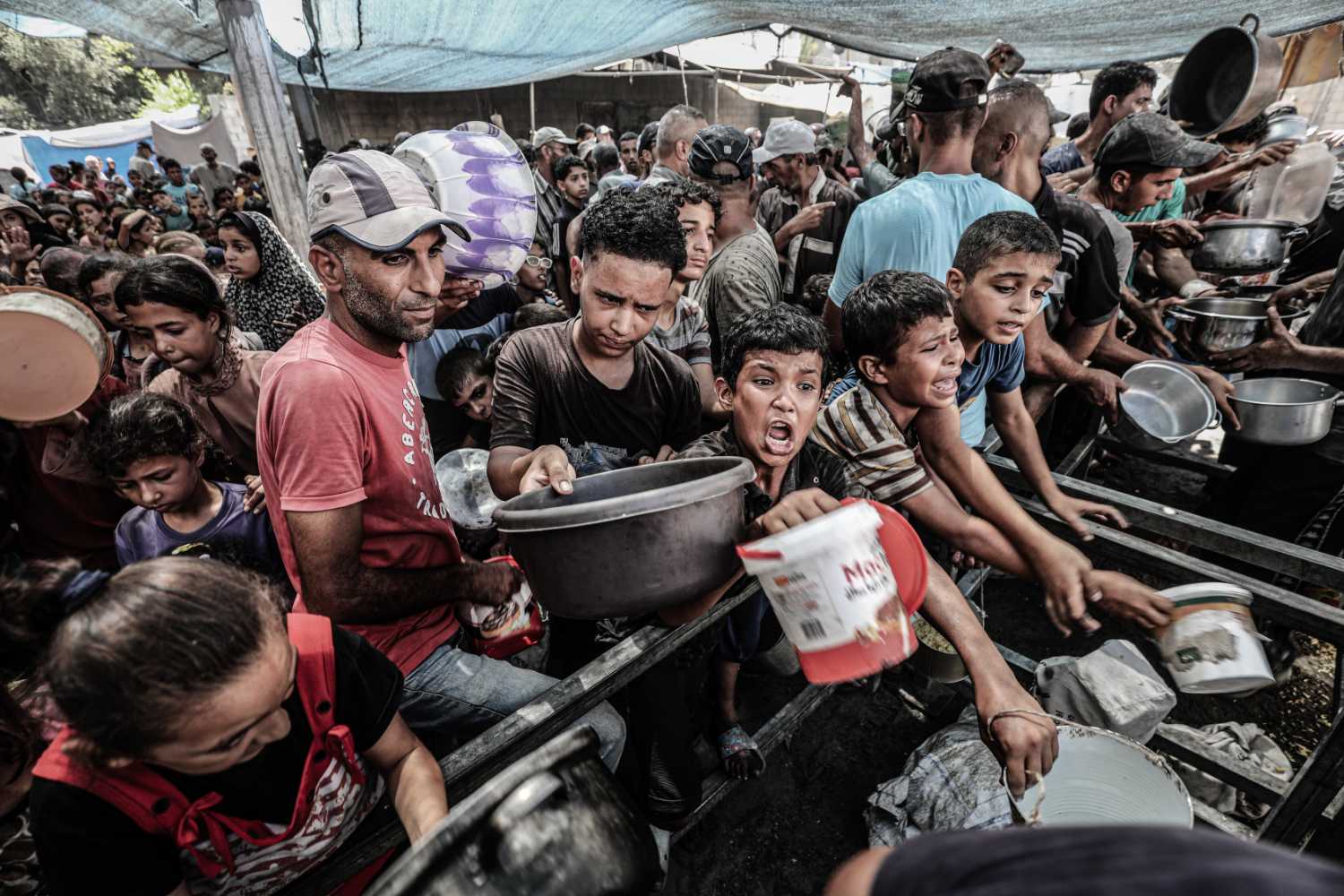The starvation of Gaza is a deliberate policy
Posted Monday, 1 Sep 2025 by Jørgen Jensehaugen & Kjersti G. Berg

In recent days, Israel has commenced new attacks on Gaza, with humanitarian aid playing a key role in its forced expulsion of Palestinians.
Long before 7 October 2023, Israel had a system in place that allowed it to inspect all consignments of aid to Gaza and to open and close access to the territory.
In 2006, Dov Weissglas, a senior advisor to the then Israeli prime minister Ehud Olmert, explained that ‘the idea is to put the Palestinians on a diet, but not to make them die of hunger’. Hamas had won the Palestinian Authority general elections, and Israel and Egypt had imposed a blockade on Gaza that restricted imports, exports, supplies of electricity, water, and humanitarian aid, and Palestinians’ freedom of movement.
In a CMI report published in 2022, we showed how the blockade had caused a large proportion of Gaza’s inhabitants to become dependent on international aid, in particular aid provided by UNRWA.
Catastrophic food insecurity
On 9 October 2023, two days after the attacks in which over 1,200 Israelis were brutally murdered, Israel’s defence minister Yoav Gallant ordered a total blockade of Gaza: no electricity, food or fuel was to be allowed in. Since then, most of Gaza’s inhabitants have been forced to flee and more than 60,000 Palestinians have been killed, including more than 18,000 children.
The starvation of Gaza is a deliberate policy. For almost two years, Israel has regularly tightened its system of border controls, often making undocumented claims that Hamas has stolen humanitarian aid.
There have only been brief periods when the number of trucks entering Gaza each day has approached 500-600, the number that the UN calculates is necessary to fulfil basic needs. Since Israel reimposed a total blockade in March 2025, the daily numbers have nosedived. UNRWA has 6,000 truckloads of aid stuck in Egypt and Jordan.
At the same time, the Israeli attacks have destroyed homes, agricultural land and essential infrastructure and the Israeli military has killed very large numbers of aid workers and medical personnel.
Figures from the IPC (Integrated Food Security Phase Classification) show that 132,000 children under 5 in Gaza are acutely malnourished, and that half-a-million people are in phase 5, ‘catastrophic malnourishment’, i.e. famine. We have now reached the threshold at which the numbers of people dying of hunger can quickly become much higher.
A shadow war against UNRWA
In parallel with the border closures, Israel has dismantled a large and functional aid system that was led by the UN, with UNRWA taking a central role, and has dramatically exacerbated the humanitarian catastrophe.
As we documented in a PRIO report, UNRWA, with its 400 aid distribution points across Gaza, served as the backbone of the UN-led humanitarian operation. Other organizations used UNRWA’s infrastructure as the basis for their own operations. UNRWA was able to perform this role due to its many decades of experience in Gaza, the trust of the local population, and its many thousands of local employees.
In January 2024, on the same day that the UN’s International Court of Justice found that there was a risk of genocide in Gaza, it became public that Israel accused UNRWA of being infiltrated by Hamas and alleged that 12 of its employees had participated in the 7 October attacks. Rapidly, and in the absence of any evidence, many countries suspended funding of UNRWA.
Many donors resumed funding following a UN report, but UNRWA’s largest donor, the United States, stopped all payments. The next phase in the dismantling of UNRWA came in autumn 2024, when Israel passed two laws outlawing UNRWA.
In our research article Israel’s shadow war against UNRWA we concluded that the Israeli laws banning UNRWA could be seen as an attack on the UN, on the existence of UNRWA, on the Palestinian right of return, and also as part of the genocide and forced expulsion of Palestinians.
When the International Criminal Court (ICC) issued arrest warrants for the Israeli prime minister Benjamin Netanyahu and for Gallant, on charges including deliberate starvation, which is a war crime, the United States responded by imposing punitive sanctions on the ICC.
During 2024, the IPC and several other humanitarian organizations warned of the danger of famine. Although the humanitarian operation until March 2025 never met the levels of need, it did provide some protection against famine and may have helped to limit the effectiveness of the forced expulsion.
Deadly humanitarian aid: Gaza Humanitarian Foundation
In May 2025, the Israeli-American Gaza Humanitarian Foundation (GHF) became operational, and Israel somewhat relaxed its total blockade after new reports of famine.
Several international organizations were allowed into Gaza, but UNOCHA reported in August 2025 that the amount of critical aid – food, medicines and tents – that were being allowed in was far from the amount necessary to prevent famine. The GHF has only distributed 60 truckloads of aid each day.
The GHF operates under the protection of the IDF and is an element in Israel’s military tactics. At the distribution points, young men race to grab boxes of aid in what are chaotic and degrading ‘death traps’. So far, the IDF and American security guards have killed more than 1000 aid-seekers by the four GHF distribution points.
UNOCHA also describes Israeli attacks on Palestinians guarding aid convoys; the storming of UN convoys by ordinary Gazans, and the theft of aid consignments by armed and/or criminal Palestinian groups. The storming of convoys is linked to food shortages, the unpredictability of access to aid, and the sky-high prices of goods that are available for purchase.
Lawlessness is prevalent in Gaza and it is extremely difficult to deliver aid to the people who need it most.
What now?
UNRWA is still operating in Gaza with local employees who provide medical and other basic services that are not dependent on imports. The United States Congress is expected to outlaw the provision of funds to UNRWA. In the face of legislative bans, a decline in donors, and shrinking budgets, the organization may collapse, with dramatic consequences.
Recently Israel has also withdrawn the accreditation of a number of international humanitarian organizations, and restricted the access of international employees to Gaza.
According to Human Rights Watch, the GHF is funded by the United States and ‘unknown sources’. In parallel with the attacks on Gaza City, we can envisage that the United States will increase its support for the GHF and the number of aid distribution points will increase. Leaked information suggests that UN organizations may be forced to cooperate with the GHF and breach their humanitarian principles in order to prevent mass starvation.
New, large-scale Israeli attacks are currently taking place in Gaza, and approximately one million Gazans who have sought refuge in Gaza City are at risk of siege, air and ground attacks, and massive destruction. People who don’t flee will be categorized by Israel as potential terrorists.
Where will the Palestinians go? The assumption is that the IDF will force them southwards and towards the GHF’s operations. There the GHF can serve as a mechanism to promote forced expulsion, either to small zones, a so-called ‘humanitarian city’ at the border with Egypt, or ethnic cleansing, referred to as ‘voluntary emigration’ out of Gaza.
The authors
- Jørgen Jensehaugen is Research Professor at PRIO
- Kjersti G. Berg is Associate Professor at NLA University College
This text was first published in Norwegian 23 August 2025 by forskning.no Translation to English: Fidotext










